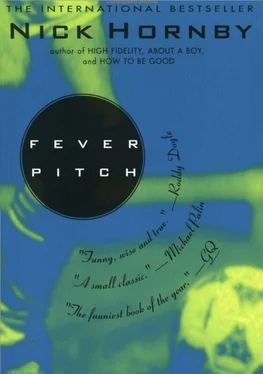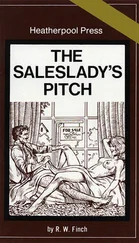In many ways, of course, this was funny, in the way that the vast majority of teenage hooligan pretensions are funny, and yet even now I find it difficult to laugh at myself: half my life ago, and I’m still embarrassed. I like to think that there was none of me, the adult man, in that furious fifteen-year-old, but I suspect that this is over-optimistic. A lot of the fifteen-year-old remains, inevitably (as it does in millions of men), which accounts for some of the embarrassment; the rest of it stems from the recognition of the adult in the boy. Either way, it’s bad news.
I did learn, in the end. I learned that my threatening anybody was preposterous—I might just as well have promised the Coventry fans to bear their children—and that in any case violence and its attendant culture is uncool (none of the women I have ever wanted to sleep with would have been particularly impressed with me that afternoon). The big lesson, though, the one that tells you football is only a game and that if your team loses there’s no need to go berserk … I like to think I’ve learned that one. But I can still feel it in me, sometimes, at away games when we’re surrounded by opposing fans and the referee’s giving us nothing and we’re hanging on and hanging on and then Adams slips and their centre-forward’s in and then there’s this terrible needling bellow from all around you … Then I’m back to remembering just two of the three lessons, which is enough in some ways but not enough in others.
Masculinity has somehow acquired a more specific, less abstract meaning than femininity. Many people seem to regard femininity as a quality; but according to a large number of both men and women, masculinity is a shared set of assumptions and values that men can either accept or reject. You like football? Then you also like soul music, beer, thumping people, grabbing ladies’ breasts, and money. You’re a rugby or a cricket man? You like Dire Straits or Mozart, wine, pinching ladies’ bottoms and money. You don’t fit into either camp? Macho, nein danke ? In which case it must follow that you’re a pacifist vegetarian, studiously oblivious to the charms of Michelle Pfeiffer, who thinks that only leering wideboys listen to Luther Vandross.
It’s easy to forget that we can pick and choose. Theoretically it is possible to like football, soul music and beer, for example, but to abhor breast-grabbing and bottom-pinching (or, one has to concede, vice versa); one can admire Muriel Spark and Bryan Robson. Interestingly it is men who seem to be more aware than women of the opportunities for mix ’n’ match: a feminist colleague of mine literally refused to believe that I watched Arsenal, a disbelief that apparently had its roots in the fact that we had once had a conversation about a feminist novel. How could I possibly have read the book and have been to Highbury? Tell a thinking woman that you like football and you’re in for a pretty sobering glimpse of the female conception of the male.
And yet I have to accept that my spiteful fury during the Coventry game was the logical conclusion to what had begun four years before. At fifteen I was not capable of picking and choosing, nor of recognising that this culture was not necessarily discrete. If I wanted to spend Saturdays at Highbury watching football, then I also had to wave a spear with as much venom as I could muster. If, as seems probable given my sporadically fatherless state, part of my obsession with Arsenal was that it gave me a quick way to fill a previously empty trolley in the Masculinity Supermarket, then it is perhaps understandable if I didn’t sort out until later on what was rubbish and what was worth keeping. I just threw in everything I saw, and stupid, blind, violent rage was certainly in my field of vision.
I was lucky (and it was luck, I can take no credit for it) that I nauseated myself pretty quickly; lucky most of all that the women I fancied, and the men I wanted to befriend (at this stage those verbs belonged exactly where I have placed them), would have had nothing to do with me if I hadn’t. If I’d met the kind of girl who accepted or even encouraged masculine belligerence then I might not have had to bother. (What was that anti-Vietnam slogan? “Women say yes to men who say no”?) But there are football fans, thousands of them, who have neither the need nor the desire to get a perspective on their own aggression. I worry for them and I despise them and I’m frightened of them; and some of them, grown men in their mid-thirties with kids, are too old now to go around threatening to kick heads, but they do anyway.
ARSENAL v DERBY
31.3.73
At this point I feel that I have to defend the accuracy of my memory, and perhaps that of all football fans. I have never kept a football diary, and I have forgotten hundreds and hundreds of games entirely; but I have measured out my life in Arsenal fixtures, and any event of any significance has a footballing shadow. The first time I was best man at a wedding? We lost 1-0 to Spurs in the FA Cup third round, and I listened to the account of Pat Jennings’ tragic mistake in a windy Cornish car park. When did my first real love affair end? The day after a disappointing 2-2 draw with Coventry in 1981. That these events are commemorated is perhaps understandable, but what I cannot explain is why I remember some of the other stuff. My sister, for example, recalls coming to Highbury twice, but knows no more than that; I know that she saw a 1-0 win against Birmingham in 1973 (a Ray Kennedy goal, on the afternoon that Liam Brady made his début) and a 2-0 win against Stoke in 1980 (Hollins and Sansom). My half-brother first came in January 1973 to see a 2-2 cup-tie against Leicester, but how come it is I rather than he who knows this? Why, when somebody tells me that he or she came to Highbury in 1976 to see a 5-2 game against Newcastle, do I feel compelled to tell them that the score was actually 5-3? Why can’t I smile politely and agree that, yes, that was a great game?
I know how annoying we are, how cranky we must seem, but there is nothing much we can do about it now. (My father is much the same about Bournemouth football and Hampshire cricket in the 1940s.) These scores and scorers and occasions are of a piece: Pat’s slip against Tottenham was not, of course, as important as Steve’s wedding, but to me the two events have now become intrinsic and complementary parts of some new and different whole. An obsessive’s memory is therefore, perhaps, more creative than that of an ordinary person; not in the sense that we make things up, but in the sense that we have baroque cinematic recall, full of jump-cuts and split-screen innovation. Who else but a football fan would use a fumble on a muddy field three hundred miles away to recall a wedding? Obsession requires a commendable mental agility.
It is this agility that allows me to date the arrival of my adolescence quite precisely: it arrived on Thursday, 30th November 1972, when Dad took me to London to buy some new clothes. I chose a pair of Oxford bags, a black polo-neck jumper, a black raincoat and a pair of black stack-heeled shoes; I remember the date because on the Saturday, when Arsenal played Leeds United at Highbury and beat them 2-1, I was wearing the entire outfit and feeling better inside myself than I had ever felt. I developed a new hairstyle (supposed to resemble Rod Stewart’s, but I never found the courage for the spikes) to go with the clobber; and I developed an interest in girls to go with the haircut. One of these three innovations changed everything.
The Derby game was a really big one. After the indifferent spell that had brought about the end of the Total Football experiment, Arsenal had clawed their way back into the Championship race simply by being what they had always been—mean, fierce, competitive, hard to beat. If they won this game (against the reigning champions), then they stood a chance of going top of the First Division for the first time since the Double year; they were level on points with Liverpool, who were at home to Tottenham that afternoon. And looking at the programme for the Derby game, one is reminded of how extraordinarily balanced football fortunes are. If we had beaten Derby, there would have been every prospect of winning the Championship again; in fact, we lost it by three points, the very gap we allowed to open up that afternoon. The following Saturday we were playing Second Division Sunderland in the FA Cup semi-final, and we lost that too. The two defeats prompted Bertie Mee to break the whole team up, but he never got a new one together again, and three years later he was gone. If we’d won either of the games—and we should and could have won both—then the modern history of the club might have been entirely different.
Читать дальше











